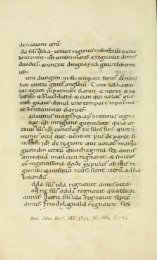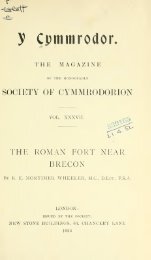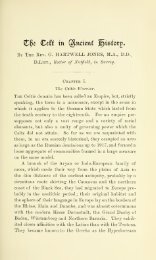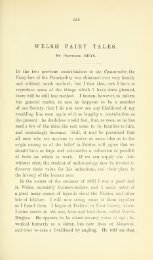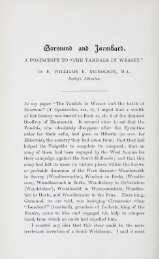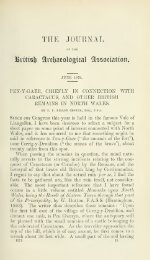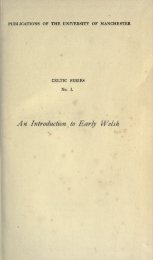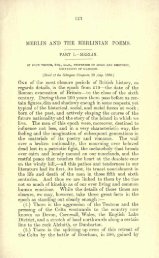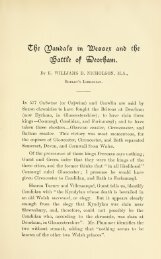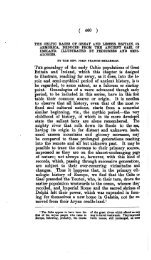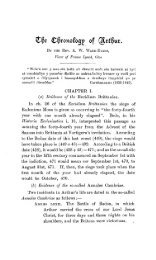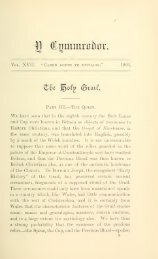Peniarth37 (English followed by Welsh) (vol17) - Arthur Pendragon ...
Peniarth37 (English followed by Welsh) (vol17) - Arthur Pendragon ...
Peniarth37 (English followed by Welsh) (vol17) - Arthur Pendragon ...
Create successful ePaper yourself
Turn your PDF publications into a flip-book with our unique Google optimized e-Paper software.
129<br />
FoL. 61a—FoL. 7Gb.<br />
Edited <strong>by</strong> A. W. WADE-EVANS.<br />
This MS. of tlie late thirteenth centurj' belongs to the<br />
so-eallea "Gwentian Code", and forms the basis of the<br />
amalgam compiled bj Aneurin Owen and printed in the<br />
Ancient Laws and Institutes of Wales under that name. It<br />
is denominated ü, and differs from its three fellows^" in the<br />
British Museum <strong>by</strong> adding sixteen folios of matter, which<br />
are found more or less alike in some of the oldest North<br />
<strong>Welsh</strong> law books, including A, that is Peniarth MS. 29,<br />
better kiio^vn as the BlacJc BooJc of CMrh; E (a faithful<br />
transcript of the last) ; G ;' and Pen. MS. 30.*' It is also<br />
found in hiter MSS. like the North <strong>Welsh</strong> D and F/ and<br />
the South <strong>Welsh</strong> Q (c. 1401), ^'burnt in 1858"/ and K (c.<br />
1469).= Dr. Gwenogfrjn Evans sajs that these sixteen<br />
folios of Pen. 37 are "iu such close agreement with the<br />
corresponding part in Pen. MS. 35 [i.e. G],'" that both<br />
must be from the same arclietjpe, or the one is a copj of<br />
the other. Both MSS. belong to the same school of writino-<br />
e<br />
1<br />
ílistorical MSS. Commission: Report on MSS. in the <strong>Welsh</strong><br />
Languaije, vol. i, purt '2, p. 371.<br />
2 Ilarleian 4353 (V) ; Cleopatra A xiv (W) ;<br />
Cleopatra B v (X).<br />
3<br />
Report on <strong>Welsh</strong> MSS., vol. i, part 2, p. 359.<br />
* Ibid., vii.<br />
5 n,ia., 367. 6<br />
n^i^i^ 361 7<br />
11,1^^ 363^ 3^7<br />
8<br />
Y Cymmrodor, ix, 298. o<br />
Report on <strong>Welsh</strong> MSS 374<br />
,<br />
^«<br />
MS. G, fo. 112-fo. 119Ô. This last page ends with the words<br />
correspouding to caffel o honi ueichogi of U 74a, the remainder of G<br />
bemg lost (sce Anc. Laics, vo]. ii, 93, n. 65).<br />
E
130 Pcniarth MS. 2)7-<br />
ancl may be the work of tlie same scribe.'" In E" the folio<br />
where they shoulcl begin is missinof, between fo. 46 and 47 in<br />
the Brit. Mus. pagination in pou-il, and between p. 94 (not<br />
inarked) and p. 97 of a pa(• {see Aneurin Owen,<br />
vol. i, p. o-}(), § 85), whilst p. 97 begins, "dwun canf<br />
aun ýu" etc, (voI. ii, p. G, § 15, and U, fo. 626 1). E<br />
apparently ended once at fo. 52a, 1. 2, with the words, "lle<br />
ny bo." (vol. ii, p. 36, § 34; U, fo. 756), and it is significant<br />
that here E and U, begin to diverge entirely. Indeed,<br />
what follows in E appears to have been written <strong>by</strong> two<br />
different hands, viz., fo. 52a, 3-11, and 52a, 12-18, where<br />
the MS. terminates (vol. ii, 37, n. 45). The present text<br />
is the oldest South <strong>Welsh</strong> version, and is<br />
now printed for<br />
the fìrst time. The oldest North <strong>Welsh</strong> version will be<br />
reproduced "in due tiine" froni A and E, <strong>by</strong> Dr. Gwenogfryn<br />
Evans,^ so that the two may be compared with profit.<br />
It wiU also be found useful to compare theni with Aneurin<br />
Owen (vol. ii, pp. 2-46) in order to see his methods<br />
of editing these texts— methods which it is<br />
suggested he<br />
was constrained to adopt'<br />
— and how far their results may<br />
be relied upon.<br />
This MS. was very kindly placed at my dis^îosal last<br />
summer <strong>by</strong> Mr. Wynne of Peniarth. I then carefully<br />
transcribed these sixteen folios page for page,<br />
line for<br />
line, error for error, and it is from this transcript of<br />
mine^ without further reference to the original, that the<br />
1<br />
lieport on Wehh MSS., vol. i, part 2, p. 371.<br />
* British Museum Additional MS. 14,!J31.<br />
3 lieport oìi Wehh MSS., vol. i, part 2, p. vii, noto.<br />
•<br />
Rhys and Brynmor-Jones, The <strong>Welsh</strong> People, p. 2o, n. 2.
Peniarih MS. 2)7- 131<br />
Hccompanying text is now copied. I have more than<br />
once in foot-notes warned the reader where I tliought<br />
the mistalce nii^ht possibly be mj own, for perhaps it<br />
more than one can hope, even in so short a transcript as<br />
this, that it should be errorless.<br />
It is<br />
proposed to publish shortl}'- a reproduction of<br />
Harleian MS. 4353, Avith the leadin*^ yariations of its<br />
fellows, together with an Introduction and a tentative<br />
<strong>English</strong> translation. The reason for the present text in<br />
Y Cymmrodor<br />
rises from its anomalous character in an<br />
early leading South <strong>Welsh</strong> book of this class. The title<br />
"Gwentian Code", which Aneurin Owen appliod to thera,<br />
is a misnomer, as there is nothing to indicate that they<br />
pertain to Gwent more than, say, to Ystrad Ty wi, or Buallt,<br />
or sorae other particular South <strong>Welsh</strong> patria. They represent<br />
in reality a compilation or a redaction of Cyfnertli ab<br />
Morgeneu, as the so-called "Dimotian Code" represents<br />
that of Blegywryd, who apparentlj was a hiter "jurist".<br />
It is with some unwillingness that I offer an Enoflish<br />
translation, m spite of Aneurin Owen's iuvaluable aid.<br />
The pitfalls are manj, tlie meaning' often obscure, and<br />
I myself a victim of that educational folly which deprived<br />
the youth of "Wales of any training whatsoever in their<br />
own tongue. This translation, therefore, is not onlj tentative<br />
but highlj<br />
so.<br />
is<br />
Ty Rhós, Fishyuard.<br />
k2
MS Pcniaríh MS. 2,7-<br />
Tentatiye Englisii Translation of Peniartii 37,<br />
Fo.<br />
CAa-IC^h.<br />
[This translation is hased on that of Aneurin Oiüen, vol. ii,<br />
pp. 2-16.]<br />
Hithorto we have treated of the laws of a court ancl tlie<br />
laws of the
Pcìiiartli MS. i^. 149<br />
ears and tlieir tongnes and thoir ejes, their deposition is<br />
to be received. Persons of an alien tongne who are not<br />
nnderstood as to what they shall<br />
say and who theniselves<br />
understand not what shall be said to theni their deposition<br />
is not to be received, unless a lord shall have pity on them. fo. 62a.<br />
Testiniony is possible as to a word and an act, and is not<br />
possible as to a thouo-ht.<br />
No rabid animal compensates for the injury<br />
it does.<br />
No animal compensates for their mutual encounter ;<br />
and the mutual encounter of animals is— a stallion<br />
which shall kill another ;<br />
a bull does not compensate<br />
for another ;<br />
nor a boar for his fellow ;<br />
nor a ram ;<br />
nor a cock ;<br />
nor a gander ;<br />
nor a buck. If they kill<br />
other animals, they are to be paid for. If a person<br />
spreads<br />
a net on sea or on land and there come either<br />
geese or other animals and they be injured because<br />
of the net and the net be injured <strong>by</strong> the animals, neither<br />
of them compensates the other. If an ox or another<br />
animal goes into a net and injures the net, and the animal<br />
escapes, it is right to make compensation, because it is fo. 62b.<br />
lawful to spread the net. If there be chattels owing to a<br />
person and there be a time granted him for those chattels,<br />
and befoi'e the time fixed the debtor obtain the chattels<br />
and offer them to him, the law states that they ought not<br />
to be refused because the time was not granted except for<br />
the purpose of obtaining the chattels. Whoever shall<br />
have a time allowed him, is owner of the time, and let him<br />
do as he shall will, either wait until the time or pay before<br />
the time. What animal soever shall kill a boneddig and<br />
the kindred seek to impose galanas on his account, they<br />
are not entitled although it be acknowledged ;<br />
and the<br />
reason for this is because one pei'son should not pay<br />
galanas and a kindred should iiot pay for the act of an<br />
animal of their kinsman ;<br />
and therefore this is the one
150 Pcniarth J/S. 2)7<br />
•<br />
case wherein the murderer is to be paid for instead of<br />
act.<br />
his<br />
Whoever shall owe chattols to another and shall seek<br />
fo. 63a. to pa}' iinmoveable chattels for the debt, there is no obligation<br />
to accept imnioveable chattels either in payment or<br />
as a pledge unless it<br />
happens that there are no other<br />
chattels in his possession. Imnioveable chattels are chattels<br />
which cannot be removed in the waj one wills. If a<br />
person goes to hunt and begins to loose his dogs on a wild<br />
animal, whatever animal it<br />
may be, and stray dogs come up<br />
and kill it; the dogs who fìrst pursued<br />
it are to have it<br />
unless the stray dogs be those of the lord ;<br />
and the extent<br />
to which the fìrst huntsman has a claim on the animal is<br />
until he shall turn his face towards home with his back<br />
on the hunt ; although his dogs continue the chase, he<br />
himself having quitted the dogs,<br />
he is to have nothing of<br />
it, althougli the stray dogs shall kill it; only the person<br />
fo. 63b. who shall own the unwearied dogs. If a traveller from<br />
the road sees a wild<br />
animal and cast at it with a stone or<br />
an arrow and efPectually, it is lawful for him to pursue it<br />
until he shall overtake it, and it is not lawful for him to<br />
shoot nor to pursue unless he is able to do so from the<br />
road. If a person hunt for fish and he start them and<br />
pursue, and as a result of his pursuit, the fish go into the<br />
net of another ; <strong>by</strong> the law the first who started them is<br />
to have possession. If persons make an agreement concerning<br />
fisli iii hunting for them and one say,<br />
"The first<br />
fish which shall be killed are mine" ;<br />
and the other say,<br />
"The last fish wliich shall be killed are raine" ;<br />
and there<br />
shall be killed only one fisli law says that where there is<br />
:<br />
no equality there must be a sharing of equal parts. If<br />
persons hunt for fish and wliilst hunting persons come<br />
fo. 64a. whilst they are being<br />
kil]ed and demand a share of the<br />
fish, they are entitled unless they shall have been put on<br />
withes [dyn tor hudt'n of MS. AJ or on hooks ; if so, they
Pcniayih J/S. t,/. 151<br />
are to liave notliiiif!^. There are three supreme seats of a<br />
lcingly Icind:' the suprenie seat of a lord, and the supronie<br />
seat of a bishop and the suprenie seat of an abbot ;<br />
each<br />
of theui is to hold his supreme seat independently of the<br />
others. If the man of a lord does wrong before the<br />
supreme seat of a bishop, let him not depart thence without<br />
making satisfaction and lilcewise a<br />
; bishop's man<br />
before the supreme seat of a lord ;<br />
and in like manner, an<br />
abbot's man before other supreme seats.<br />
"When the bishop<br />
shall die, liis chattels belong to the lord, except the vest~<br />
ment of tlie church and its books and its land ;<br />
the reason<br />
it should be so is that everj chattel wliich shall be without<br />
an owner is a "king's waste"; as for an abbot however,<br />
a lord is to have nought save his ebediw ; when thc abbot fo. 64b.<br />
shall die, his cliattels go to the communitj (clas) and its<br />
canons.<br />
Every dispute which shall be among themselves, is<br />
to be decided <strong>by</strong> judges from the community (clas).<br />
Every<br />
is to<br />
dispute whicli shall be between an abbot and a lord,<br />
be decided <strong>by</strong> the lord's judges together with them. If<br />
there be two lords and each has an army in the gwlad and<br />
a person come to solicit investiture of land, their grant is<br />
no «rrant and their investiture no investiture until it sliall<br />
be known which of them is lord of the gwlad. If an<br />
uchelwr place his son with an aiUt to be fostered with<br />
consent of lord and he remain there a year or two or three ;<br />
when the aillt shall die, unless he has children, what he<br />
leaves behind is to come into the foster son's possession ;<br />
and if lie has children, the foster son is to have the share fo. 6.5a.<br />
of one of them.<br />
If a C^^mric wouian be given in marriage<br />
* Aneurin Owen n;ives brej-nyauc as the reafling of A and E ;<br />
brenhinaól as that of D aiul Q ancì breinhaól as that of<br />
; F, G, K, ü.<br />
The reading of U however is bze«inha61. and as he generally disregards<br />
marks of contraction in the <strong>Welsh</strong> texts, one niay surmise that<br />
this last is the reading of F, G, K as well.
•<br />
Peniartli Ì\ÍS. o/<br />
to an ciUtuJ, a son of liers is to have a brother's share of the<br />
father's trev ;<br />
aud such is not entitled to a share of the<br />
principal honiestead nor is he entitled to ofîìce tiU the<br />
;<br />
third descent, he and his son and his grandson henceforward,<br />
let liini receive his right of office and of the privi-<br />
;<br />
ledged houiestead unless the alltud be an Irish or Saxon<br />
priuce (gyliolaeth)' who is imniediately entitled to office<br />
and to a share of the privileged honiestead : and therefrom<br />
is paid cattle Avithout suretyship cattle without<br />
;<br />
suretyship<br />
signifies the share of the alltud fatlier, because he has no<br />
lvindred in the same gwlad as himself, and those cattle are<br />
not shared till the seventh descent like other galanas but<br />
fo. 6öb. to the second cousin. If a person give a thing \read peth<br />
for póyth] on loan to another and it be not demanded on<br />
the morrow, he is not to demand it until the end of a year<br />
and a day and thon lot him take a pledge as for othor duc.<br />
Ebediws.<br />
îbediw of a maer canghellor ;<br />
a pound. Ebediw of a<br />
maer ;<br />
six score pence. Ebediw of a canghellor ;<br />
six score pence. Ebediw of an aillt, if there be a church<br />
on hisland; six score pence otherwise, three score pence.<br />
:<br />
Ebediw of an alltud; twenty four pence. No ebediw is to<br />
be paid for increasing land (tir kynnif). If a person part<br />
Avith his land in his lifetime and he die after that, ebediw<br />
is not payable for his land but only for his chattels ;<br />
if there<br />
be no chattels, the ebediw will be extinct ;<br />
or if he lias chatfo.<br />
66a. tels, the son is to pay his father's ebediw. Every<br />
officer in<br />
the court— six score pence is his ebediw except the chief<br />
ones of the court, to wit, the steward, chief groom, chief<br />
1 "<br />
A chief iiot aii cídling nor hcad of a family" (Owen, voL ii, 1117).<br />
It aiipaiently ,sijítiilie.s<br />
one of the oflspring of a brenliin or teyrn,<br />
exchuling tlie udling ; a princc as opposed to a crown-princu so to<br />
Bpeak.
Pcniarth MS. 3;. 153<br />
faleoner, cliief liuntsman, pa^e of the chaniber a<br />
; j)ound<br />
is the ebediw of each of theni. An innate boneddig and an<br />
uehelwr and a cjY^arwys man (kjuarl"a6c)' are to pay ebediw<br />
althouürh they niay have no hmd in their possession they<br />
;<br />
are to pay according to the privilege of the land whoreon<br />
they were born. If a nian has two lords and hold land<br />
under each of thein, he is to pay ebediw for each of theni.<br />
If a man holds two lands under one lord, he is to pay<br />
ebediw for the one of greater privilege. If an alltud<br />
traveller fall ill on a road and die, on vvhatever land he<br />
shall die, twenty four pence is to be paid for liis ebediw ;<br />
and his chattels for that to the lord ;<br />
if it be a female,<br />
sixteen pence. The amo<strong>by</strong>rs of the diiughters of the men<br />
whom we mentioned above, are of the same amount as the<br />
ebediws of their fathers.<br />
A woman never pays more than<br />
one amo<strong>by</strong>r, and that she pays according to the privilege<br />
of the land she was born on, and no one is to pay for her,<br />
only she herself ;<br />
unless her father or her brothers or her<br />
kindred give her without taking surety for her amo<strong>by</strong>r,<br />
the givers are to pay since they took no surety for it. The<br />
reason a Avoman pays amo<strong>by</strong>r once only<br />
is because she<br />
continues according to the privilege of the lord of that<br />
land and not according to the privilege of her kindred but<br />
according to the privilege of the man to whom she goes.<br />
For three causes is<br />
amo<strong>by</strong>r paid one of them is for : gift<br />
and investiture before there shall be connexion ;<br />
the second<br />
is for notorious connexion before there be gift<br />
and investiture<br />
; the third for is, pregnancy. Three daugliters<br />
who owe no amo<strong>by</strong>r the daughter of an edling and the<br />
:<br />
dauçrhter of a lord and the daughter of a chief of household<br />
;<br />
the reason they owe not is because their fathers owe<br />
fo. OGb.<br />
fo. 67a.<br />
^<br />
A reads lcauarussauc (vol. ii, 14; ; Seebohm's Tribal System în<br />
Wules, p. 66, etc.
154 Peniarth MS. 2)7-<br />
no ebediw except their steeds and their f^royhounds and<br />
their hawlcs and their arins. The daughter of a kn-d owes<br />
no ainobjr because there is no one to ask for it ;<br />
and he<br />
is<br />
not entitled to the amo<strong>by</strong>r of his own daughter.<br />
"0<br />
Of a Prince.<br />
^o prince owes an ebediw ;<br />
the reason is because of his<br />
large due where<strong>by</strong> h; free from every small due,<br />
fo. C7b. unless it<br />
happens that he takes hmd and assumes the status<br />
of an uchelwr ; however bond his l;uid<br />
may be, it becomes<br />
as free as the hmd of an uchelwr ;<br />
and thenceforward he<br />
also pays amo<strong>by</strong>r<br />
anc] ebediw like aii ucliolwr pays; previous<br />
to that he did not pay save as an edling pays.<br />
Jipjihe amo<strong>by</strong>r of a chief of kindred's daughter ;<br />
a pound.<br />
^Lä) Ever3'- such person who shall pay amo<strong>by</strong>r, the aino<strong>by</strong>r<br />
of his daughter shall be of the same aniount as his own<br />
ebediw.<br />
_<br />
Jhe amo<strong>by</strong>r of a chief minstrel's daughter and his own<br />
ebediw when a lord shall invest him with the office<br />
of a chief minstrel ;<br />
six score pence. Every other minstrel<br />
unless he shall have been privileged [according to] his own<br />
due whether he be a proprietor (na thref tadaóc) or an alltud ;<br />
fo. 68a. in like manner he pays his daughter's amobj^r and Iiis own<br />
ebediw. Every chief mmstrel whom a lord shall invest with<br />
the office of a chief minstrel— tlie lord is to procure for him<br />
an instrument, to wit, a harp for one, a croud for another,<br />
a pipe for the third ;<br />
and when they shall die, they are to<br />
leave theui to the lord. Every chief liarper is entitled<br />
from the young rainstrels learning to play the harp and<br />
who will to leave off the hair strung harp and to become<br />
competitors (yn eirchat)— the chief harper<br />
is entitled to<br />
twenty four pence, and he receives if demanded the share<br />
of two men from what comes from every gratuity either
Pcniaríìi J/S 2>7- :>:><br />
as a boon or a nuptial gìit, wliether he be present or not so.<br />
A nuptial gift is<br />
twenty four pence, if the wonian be a bride fo. 68b.<br />
[for the first tinie] and that to the bards; and the chief minstrel<br />
is entitled to their service as one in authority over<br />
theni. Sonie say that "inquiry as to a stock" relates to a<br />
person divested of everything; others say tliat it relates to<br />
an oak cut down without permission on a patrimony others<br />
;<br />
say that the right meaning of inquiry as to a stock is this,<br />
when the kinsmen shall refuse the murderer his share of<br />
the gahmas and shall ask, "Whence the stoc^ I am rehited<br />
to thee?"; then it is necessary for the murderer to exphiin<br />
to him the stock and how he is kin to him, in the mode<br />
we mentioned above ;<br />
and together with that, that he has<br />
to maintain the truth of what the<br />
co-relatives enough<br />
murderer states ;<br />
the reason that liis co-relatives in that<br />
case are elders is because strangers are not to connect a fo. 69a.<br />
person with his kindred nor to separate him therefrom.<br />
Fathei—Brothei— 1*' cousin=2"'^ cousin=3'''^ cousin= í"' cousin=5"' cousin<br />
^Murderer<br />
Mothei=Brotlier=l'' cousin=2'"*cousin=3"' cousin=4*'' cousin=5"' cousin<br />
?rf a person kill another <strong>by</strong> waylaj'ing or <strong>by</strong> murderous<br />
^ assault, he pa^'s a double galanas as it is a ferocious<br />
act ;<br />
and he is<br />
put to death in lieu of one galanas and the<br />
other 011 the k.indred ;<br />
and he is to be executed according<br />
to the lord's will whether he shall will<br />
slaying or burning<br />
or hanging ;<br />
if he deny<br />
let liiin giv^e a twofold denial for<br />
murder, to wit, the oaths [of six hundred men] .<br />
If persons<br />
poison others, let the lord clioose whether to banisli them fo. 69b.<br />
or to put tliem to death. If tliey deny, let them give the<br />
oaths of six [hundred nien] .<br />
^f a person claims a tliing from another and draws back<br />
^ therefrom on the field [of trial] and prefers being
I só Pcìiiaìili J/S. j/<br />
silont to iiialdno; the clairn, tlie<br />
law allows him to be silent<br />
beeanse it is at his option whether to proceed with his claini<br />
or not to proceed ; altlionyh the defendant may call for a<br />
decision and on the ground of his drawing back, a decision<br />
against him as to the chattels, yet the hiw does not<br />
deem it right to decide against liim as to the possessions<br />
or liis claim, but because he refused the time fixed,<br />
that he is without a fixed time on the field. If it<br />
happens that he gave surety to abide <strong>by</strong> what the law<br />
should determine, and sit with his party and commence<br />
pleading and hear a reply and after that [seek] time<br />
fo. 70a. for aid and say, "I am entitled as I have my option",<br />
and then the defendant should say, "Although it might<br />
have been at thy option it is no longer so, since a<br />
settled thing accords not with choice ;<br />
and hast thou not<br />
chosen to plead<br />
'? aud therefore I aj^peal to the law tliat<br />
thou shouhlest not retract", the<br />
law there perceives that<br />
he has no resource but to have the hiw administered<br />
promptly ;<br />
and if the phiintiíf be quitting the field let a<br />
cross be set up before him that he does not go ;<br />
and if he<br />
goes, let the defendant call for adecisiou and thou th(> hiw<br />
provides that he is barred from proceeding with his chiim<br />
during the time of that hjrd ;<br />
and three kine camlwrvv^ to<br />
the king and according to others, twice that, A virgin<br />
wife is the name given to one who is betrothed to a husband<br />
and she remaining a virgin and not slept with ;<br />
if a<br />
rape be acknowledged on her, some say she is not entitled<br />
fo. 70b. to cowyll. Others say slie is entitled because the law says<br />
that whoever shall violate virginity sliould pay to her, her<br />
cowyll. Whoever shall cause the pregnancy<br />
of a wonum<br />
of bush and brake, until she shall ]iave given birth'<br />
1 Prof. Rhys, in rcply to niy reqnest as to this and another passage<br />
(see next note), kin(lly sent me the following translation of namyn yny<br />
awgho — ''until slie shall have given birtli, until she have been deliyered".
Peniaì'tli MS. o/- O/<br />
it is not ineumbent on lier to niirse the offsprinf^ durinor<br />
\o(ììer<br />
AISS. read longer than] the swaddlin^ nionth,<br />
because since she has not had the support of the nian, the<br />
law does not consider that she shouUl be in want on his<br />
account.<br />
forae<br />
say that the suretj of a woman is no surety ;<br />
the law savs that the surety which a woman shall<br />
odve is a suretv althouçrh no woman can be a suretv herself.<br />
When a woman shall denv a suretv, a man denies it with<br />
her, for it is a man who denies. Any person against wliom<br />
there is a chiini and who refuses and fails to come to do<br />
right in regard to such a claim pays camlwrw to every<br />
court which he shall have refused to come to. If he<br />
shall come to<br />
the court and withdraw from the court unhiwfully,<br />
and the pUiintiff call for the law's decision, the<br />
cause for wliich the chiim arose is to be awarded to the<br />
plaiutiff ;<br />
and camlwrw to the lord ;<br />
and the defendant for<br />
lea^'ing the field unhìwfuUy<br />
is to receiv^e no redress therefor<br />
during the time of the lord wlio sliall own the fiehl on<br />
that day. If he come to the field to suffer pleading and<br />
reply and the law decide that he has lost, he loses that<br />
suit for ever.<br />
V/)|'hoever appears in the court of the lord<br />
in a cause and begins to be questioned<br />
if he takes<br />
;<br />
counsel before giving a reply, he is to be condemned ;<br />
defendant is to testif}' he did not deny<br />
account the law states it is acknowledsed.<br />
the<br />
fo. 71a.<br />
and on that fo. 71b.<br />
^f a person sue during the blank days, he does not on<br />
-1? that account either lose or gain ;<br />
unless the issue of<br />
loss or gain be so stipulated and if it be so<br />
; stipulated,<br />
the whole is lost ;<br />
and iu like manner as to land and soil<br />
in the times when the courts are to be shut.
158 Peìiiarth MS. 2,7<br />
Jlie following is the legal form of sittino^ in the lord's<br />
court on the cla}' appointed<br />
for law : tlie lord is to<br />
sit with his back to the sun or to the wind so that the<br />
brunt of the weather niaj not be on his<br />
two elders one on each side of hini and his<br />
face, havin^ his<br />
nobles around<br />
hin), and the judge of the court in front of his knees, and<br />
the judge of the commote on one side of him and the priest<br />
on the other side, and a passage fronting hini for him to go<br />
and come to his judgment seat; and two parties on each<br />
fo. 72a. side of the way with the two pleaders nearest to the way<br />
fo.<br />
on either side thereof, and the two suitors in the cause in<br />
the middle and the two guiders next to them ;<br />
the defendant's<br />
party with tlieir right hand towards the way<br />
and Ihe plaintiíî's party with their left hand towards the<br />
way ;<br />
and the two appai-itors standing before (gen bton)<br />
the two pleaders.<br />
the plaintifî is to ask, "Who is<br />
thy pleader ? who<br />
fihen _ is<br />
thy guidor ? " and then let him be asked whether<br />
he will abide loss or gain at their hands, and then let<br />
him say he will ;<br />
and then let the defendant be asked<br />
whetlier he also will abide [loss or gain] at the hands<br />
of the party which shall be with liim, and then it is<br />
right for him to promise that lie wiU ;<br />
and it is riglit<br />
to take security that they abide loss or gain in respect<br />
to what we liave mentioned above; and that is called<br />
a compact ;<br />
and then the pleadings. And then let<br />
the judge take the two pleadings and recapituhite tliem<br />
721).<br />
publicly before moving from his phice, and after that let<br />
them go to their judgment seat, the judges and the priest<br />
with them praying and an apparitor keeping his place,<br />
and let him adjudge the sentence ;<br />
and after he shall<br />
adjudge it, he is to come in, and before pronouncing it, let<br />
him take the security of the surety for his fee ;<br />
and after
that let liim pronounce sentence ;<br />
Peniarth Jl/S. 37. 159<br />
and to the one in whose<br />
fuvour the case shall be decidecl it remains established.<br />
i^^í a person give money or an animal to another and the<br />
42 receiver barter -with such chattels and gain there<strong>by</strong><br />
and he who owns the chattels shall demand a share of the<br />
gain, the law does not saj that he is entitled to it unless an<br />
agreeraent assign it to him; and thereforethe lawsays that<br />
money (l"6ttt) is not to be stationary, and that is called the<br />
fruitless claim [for he receives] only what he gave to the<br />
other. If a person comes to stay a while at another's<br />
house, having an animal with liim or other chattels : fo. 73a.<br />
when he departs, he is not to take with him the offspring<br />
or dung or crop nor [has he] any right as<br />
regards anything,' only what he brought with him,<br />
unless an agreement assign<br />
it to him ;<br />
and therefore<br />
it is said, An agreement<br />
is<br />
stronger than justice. If<br />
a sow is taken away stealthily <strong>by</strong> a person and she rear<br />
offspring with that person, and the owner know where she<br />
was and should demand both her and her otfspring, he is<br />
not entitled <strong>by</strong> law save to her alone if she bein existence;<br />
and if she be not, he is to have nothing, for the law says<br />
its course more than<br />
then, A flood will not render muddy [in<br />
is taken <strong>by</strong> it] .<br />
that he is<br />
paramount<br />
"VVhoever shall refuse right from supposing<br />
in his claim and that he is entitled<br />
to claim when he will, let him be ;<br />
and if he neglects his<br />
claim for a day and a year and does not proceed with it,<br />
becomes a chiim beyond the year ;<br />
thenceforward there is fo. 73b.<br />
to be no justice as to it. If a person iilegally take a<br />
distress, let the distress<br />
be returned and the cause remain<br />
it<br />
^ Na neb deflef o dim. According to Ancient Lnus, ii, .30, n. 9,<br />
dotrefnyn is the readinf; of D and F, dedyf of G and U, dyuot of K,<br />
and diodóf of Q. Prof. Rh.s writes, "(?) 'nor any right as regards<br />
an\-thing', but I should think it more likely there was a mistake of<br />
some kiud here ;<br />
but dodrefnyn does not look very probable either,"
i6o Peniarth MS. 2,7-<br />
as before ;<br />
in such a case it is said that he is not entitled<br />
to hiw wlio does not confonn to it ; that whieh ho did<br />
illegally is made good<br />
and the cause is as it was before.<br />
If a person beconie a surety, and before the terniination of<br />
the suit become a leper or a monk or blind or should<br />
suppose that he is not to answer, the law says that he is<br />
to make good what lie<br />
promised while he lives and this is<br />
;<br />
one of the places where a son is not to stand in lieu of his<br />
father ;<br />
the reason is because he has left none of his<br />
cliattels to him, therefore he is not to stand for him except<br />
to [or it be] the churcli. If a person sue before the time<br />
appointed for loss or gain, it will not there<strong>by</strong><br />
avail hini<br />
fo. 74a. until the time. If a virgin declare that she has been raped<br />
and the man deny and she then say, "If thou didst not<br />
commit a rape upon nie, I am still a virgin", the law then<br />
adjudges her to be exarained and tliat <strong>by</strong> the edling. If<br />
he fìnd her become a woman, the accused cannot deny,<br />
and then let the man wlionì she charges with having violated<br />
lier pay her cowyll and her wynebwertli to<br />
her and<br />
her amo<strong>by</strong>r to the lord. If he find her to be a virgin let<br />
her retain the status of a virgin and let her not lose her<br />
privilege, her examination notwithstanding. If a rapo be<br />
committed on a virgin and she become pregnant in consequence<br />
and she know not who the father may be and the<br />
lord demand amo<strong>by</strong>r and she say that she ought not to<br />
pay it because a rape was committed on her and no woman<br />
fo. 74b. who is<br />
raped is to pay amobj'r; the law says in that case<br />
the amo<strong>by</strong>r to the lord is extinguished since he was unable<br />
to preserve her against rape and he bound to preserve<br />
her against injustice aiid ; although<br />
slie be doubted as to<br />
her having been violated, let her make an oatli that wliat<br />
she says is true and after that she is to be believed. The<br />
son of such a wonian is<br />
adjudged to take the status of his<br />
mother's kindred until she shall know who his father may
Pcnìaìih J/S. 3;. 161<br />
be. If a man assert tluit a wonian is pre
i62 Peniarth MS. ^y.<br />
stroiig<br />
ones of the worltl : a lorcl and a liead-<br />
fjliree _ strong persou and a pauper. The reason is : a lord<br />
is like a stone along the ice ; a headstrong person<br />
is an<br />
idiot, aud an idiot is not to be ruled in anything against<br />
his will ; a pauper is a person who has no chattels, and<br />
therefore chattels cannot be exacted where there are<br />
none. If a woman assert against her husband quod vir<br />
non potest copuhire, and for that reason seek to separate<br />
from him, it is rig'ht to prove whether what she says<br />
is true. Thus it is to be proved<br />
:<br />
[lex requirit] linteamen<br />
album recens lotum sub illis<br />
expandi et virum in illud ire<br />
fo. 76a. pro re venerea et urg-ente libidine eam super linteamen<br />
projicere ; et si fiat satis est ;<br />
et si non possit, potest se<br />
sejung-ere ab eo without losing aught of the property.<br />
fhree stays of blood blood to the brow : (hyt ran),<br />
For the<br />
blood to the stomach, blood to the ground.<br />
two there is to be nothing owing<br />
if<br />
it be determined that<br />
they are not to be compensated; for the third, if matter of<br />
scandal, there is due for making the earth bloody, to the lord<br />
thereof ;<br />
and if there be complaint, satisfaction is due for<br />
every one of them, and what is due for every one is a dirwy<br />
to the lord ;<br />
and there is no compensation for his blood to<br />
the one who shall receive [tlie wound] or who says so,<br />
according to the law. Woods are to be preserved from<br />
the Festival of<br />
St. John, when the swine shall go<br />
into the<br />
woods, until the end of the sixth day after the Kalends [of<br />
January], and within that time the pannage ought to be<br />
couipleted. If two persons be walking through a wood, and<br />
a branch, <strong>by</strong> the passing of the one in front, should strike<br />
the one behind aud his eye be lost, he is to pay him for<br />
his eye.
Penìarth J/S. t,";. 163<br />
Tlieso aro thoy whoso tostiiiiony<br />
is not to l>o rroditod. fo. Tob.<br />
J^ondinan, a mute, a cleaf person, an innate idiot, or<br />
maniac, or one who shall be less than fourteen years<br />
old, a spendthrift who shall have exhausted all his chattels,<br />
one who shall swear notorious false oaths, one who shall<br />
publicly break his marriage vow, a traitor, or one who<br />
shall kill his father, one who sliall debase true coin or who<br />
shall make false coin, one who shall j^urloin ecclesiastical<br />
chattels or other chattels from a church, one who shall<br />
have sexual<br />
wittint^ly give wrong judgment, one who shall<br />
intercourse with another man or with another animal, one<br />
who shall wittingly bear false witness.<br />
Hero tornnnates the body of the laws to^-otln'i- witli<br />
the casualtios as we found tlieni best.<br />
Brief Gîossary of <strong>Welsh</strong> Wonls in the Translation.<br />
aillt— yillein, or serf.<br />
alltud— — foreigner, person from another patria.<br />
amohyr fee payable to lord on marriage of a female.<br />
— boneJdíg person of free innate lineage, the Cymro proper.<br />
camlurir— fine payable to the lord.<br />
cnnyhellnr — territorial oftìcer who determined disputes among king"s<br />
villeins, etc.<br />
— coìryll gift — of bridegroom to bride morning after nuptials.<br />
cyrari/y.'i rights belonging to a free kinsman when he came of age.<br />
eòediic— heriot, relief payable to lord on death of member of a free<br />
kindred.<br />
edliny — heir-apparen t.<br />
yalanas — honiicide and paj'ment for homicide.<br />
yiraesar— "pledge, or guarantee" (Ancient Lairs, ii, 1117).<br />
ÿíí/ffrf—patria, or country.<br />
ytryncbicerth "face worth", a fine payable to a woman.<br />
maer— territorial officer who regulated villeins, etc.<br />
saraad— insult and payment for insult.<br />
uchelwr— nobleman.<br />
31 2
132 Peniarth MS. o/<br />
PENIARTH MS. 37. FOL. 61a— 76b.<br />
Hyt liyn ytraeth*' íiffam lc^eu îtys a chyfreitlieu yr<br />
ííwlat, }ivti athiii. o; (lainwc'iiR'U.<br />
)0h" lcyulauan awnel clyn oe anuod diwyget oe uod.<br />
(P'<br />
O deruyd y dynyon ynuyt ftad dynj^on ereiìt:'<br />
Talher galanaf droftunt Mal dynyon póyìtaóc. Canys<br />
kenedyl adyly eil cadó rac g-wneuthur cam o honunt. Pa<br />
dyn póyîtaóc <strong>by</strong>nhac a hido ynuyt. Talet galanas Mal<br />
galanas dyn póyíîaóc. Ny diwygir farhaet agaífer gair ynuyt.<br />
ac ny diwyg'ir farhaet agaffo ynteu. Nyt góneuthuredic<br />
Mim QX a wnel dyn siedó Na Mach arodho yny ueddaót<br />
Na fyd aratt a adaóho.<br />
deruyd bot dyn yn gyndeiraóc.<br />
abrathu dyn araît o honaó ae danhed ac o% brath hónnó<br />
fo. Gll). dy * uot agheu yr dyn Nys dióc kenedyl yr ynuyt ef.<br />
Canys o annóyt yr heint y coítes y îtaît y eneit. Dyn Mut<br />
Ny thelir farhaet Nac atteb odyn' aratt iddaó Cany<br />
dyweit ehun y dylyu o honaó. Onyt arglóyd atrugarhaa<br />
6ztha6 aroddi dyn adywetto drofta6. Byddeir adeiîton<br />
Ny M6ynheir dim oi a dywettont yn dadleu Cany wehis<br />
y neiîi ac na ch]y6 y itaît o honunt. 6zth hynny Ny<br />
M6ynheir dim' ox a dywett6ynt. Pob anaf arait o2auo iach<br />
'<br />
The first pait of this rubric, to the a.sterisk, is the last half of 1. 18<br />
of fol. 60b. An asterisk signifies the end of a page, which generally<br />
in U contains 18 lines.<br />
2<br />
The stem of tho missal capital is mado to rnn down the left<br />
margin to the ft)ot of the pago. llubricated lutters are not noticcd<br />
in this reproduction, only rubrics and rubric capitals. Rubricated<br />
letters are very numerous. Italicised letters indicate contractions.<br />
^<br />
Before dim at end of preceding line, there is a d. with atop<br />
crossed out.<br />
*<br />
odyn is divided between I. 4 and 1. 5, the former ending od and<br />
the latter beginning dyn.<br />
^<br />
Before dim at cnd of preceding line, thore is a d crossed out.
Peniayth A/S. ^y. 133<br />
y clufteu. ae tauaót ae lygat. kynieredic j6 eu hymaclraócl.<br />
Dynyon a
'"'<br />
The<br />
134 Peniarth AJS. 2>7-<br />
gweitliret anjueil yn gar. ac 6ith hynny h6n y6 yr un<br />
tte ytelir y ttouurud yn tte y weithret.<br />
P6y<strong>by</strong>nhac adylyho<br />
fo. 63a. da y aratt achei{fa6 tahi' * da aghyuodedic ohonaó ani y<br />
dylyet. Ny dylyir kyniryt da aghyuodedic nac yn tal nac<br />
y»g g6yftyl ony <strong>by</strong>d' na bo da amgen ar y hel6 Sef yô da<br />
aghyuodedic:^ Da ny aher y d6yn fozd y Mjmher.<br />
Oderuyd<br />
y dyn Mynet y hely adechreu eít6g ar 6yd 16d6n pa any ueil<br />
<strong>by</strong>nhac uo achyfaruot c6n fegur ac ef ae lad. y k6n kyntaf<br />
ae kynhely6s bieiuyd onyt c6n yr argl6yd y^ uydant yrei<br />
fegur attjma hyt ydyl}' 3'r hel6i kyntaf uot yr anyueil<br />
yny ardel6. yny ymchoelo y 6yneb partli ac adref ae<br />
geuyn ar yr hely kyt bo y k6n ef yn hely ac ynteu g6edy<br />
yr ymada6 ae c6n. ny dyly dim o hona6 kyt lladho y c6n<br />
fo. 63b. fegur ef Namyn yneb biei * íîo y k6n difiin deruyd<br />
yfo2da6l y ar y fo2d gwelet g63^dl6d6n ab6r6 ergyt ida6 a<br />
Maen Neu afaeth ae uedru:^ Ja6n y6 ida6 y erlit yny<br />
godiwedho.' ac nyt ia6n ida6 y faetliu Nae ymlit onyf<br />
Meder 3^<br />
ar 3^<br />
fo:d.^ O doruyd y dyn heh^ pyfga6t ae<br />
kyuodi o hona6 ae h^^mlit.<br />
ac ar y ymlit ef Mynet y p3'fc<br />
yn r63^t aratì. O Ÿ'' . 3'k3^ntaf a kyuodef bieiuyd. d^.<br />
y dyn^'on wneutlmr ammot am pyfga6t yn eu hely. heb<br />
yneih ypyfc ^^mtaf aladher j mi. Heb 3'tlatt ydiwethaf<br />
aladher 3^<br />
MÌnheu ac naladher naniyii un p3'íc.<br />
k''^.<br />
ad^'weit yny' bo ^yh^'ded d^'l^ai<br />
rannu deuha?nier. Od'"^.<br />
3^d3myon hely pyfga6t ac yny hely dyuot dyn^^on<br />
6zth eu<br />
1 At the foot of the page<br />
under talu is the catch word da in an<br />
oblong figurc.<br />
line.<br />
'<br />
V)y(l<br />
is<br />
precedod <strong>by</strong> a b. with stop<br />
crusscd out. This b. cnds a<br />
This<br />
•'<br />
y is crossed out witli black and red through lower stem.<br />
* Tiiis word is dividud betwcen two lines thus: god diwcdho.<br />
stop<br />
is tlu! kind f invcrtcd conima rcfcrred to bt^forc.<br />
•'<br />
This word is<br />
preccdcd <strong>by</strong> a k cxpunctctl<br />
preceding.<br />
"<br />
This word is divided between two lines thus, y ny<br />
at the end of the line
Peniartli MS. 2)7<br />
•<br />
JO<br />
ttad ac » erclii ra?iii oi py%a6t. Ii6y ae dyljaii ony<br />
deruyd eu dodi ar dyii Neu ar uacheu o deruyd liynny Ny<br />
dylyaut diiii. Teir goiffed bie?ûnlia61 yi'fyd Goiííed<br />
argl6yd. agoiffed efgob. agoiffed abbat. Pob un o<br />
nadunt adyly daly go^Jfed tr6yda6 eliun. Od^. y6r yr<br />
argl6yd g6neutliur cani yif goiffed efgob Nac aet olioni<br />
lieb wneutliur ia6n. ac y ueii'y g6i yr efgob yg goiffed<br />
yr argl6yd.<br />
acyuetty g6i yr abbat yny goiffedeu ereiH.<br />
yr argl6yd pan uo Mar6 yr efgob adyly yda. Eitliyr<br />
g6ifc yr egl6yf. ae ilyfreu. ae tir. Sef achos ydyly Pob<br />
da auo heb perchenna6c diffeith bienhin y6. abbat hageii<br />
Ny dyly' argl6yd Namyn y ebedi6 pan uo Mar6 yr<br />
abbat. y clas ae canonwyr adyly yda ef. Pa dadyl<br />
b^'iihac auo y iydunt ehun:^ j'neit oz clas adyly barnu<br />
udunt. Pa dad\'l <strong>by</strong>nnac auo y abbat ac argl6yd:' yneit<br />
yr argl6yd adyly barnu y gyt ac wynt. O d^uyd bot<br />
deu argl6yd ailu gan bob un o nadunt yny' wlat. adyuot<br />
dyn y geiffa6 eftyn ar tir Nyt rod eu rod ac nyt eftj-n eu<br />
heftyn yny 6yper pieiffo y wlat o honunt. Od^uyt y<br />
uchel6i roddi yuab y eittt ar ueithrin o ganyat argl6yd<br />
ae ryuot ef a^ abl6ydyn ad6y atheir. pan uo Mar6' y Mab<br />
eillt o ny <strong>by</strong>d plant ida6. y dylj^et adyg6yd yn }la6 y<br />
Mab Maeth ac o'<br />
<strong>by</strong>d plant<br />
fo. fi4a.<br />
fo. (j4b.<br />
ida6 * raíin un o hoiiunt fo. 6öa.<br />
adyly y Mab Maeth." Od^uyd rodi líj'inraes y honiio adyly ra?in bia6t otref tat. ac ny dyly h6nn6<br />
atttut. Mab<br />
ra/m o: tydyn arbenhic Nac of6yd liyt y trydyd dyn.<br />
^<br />
(lyly<br />
is aì)Ove the line, with mark of omission.<br />
2<br />
yny is (livi(lecl between two lines thus, y ny<br />
3 a is above the line, with a mark of omission between ef and ef,<br />
which last is crossed out and has each letter expuncte(l.<br />
^<br />
Mar6 is<br />
preceded on the line ab()ve <strong>by</strong> M expuncte(l.<br />
'"<br />
The scribe wrote ony and then crossed out the two last letters,<br />
expuncting them.<br />
^<br />
Maeth begins a line. The proceding line ends with m crossed out<br />
and expuncted.
136 Pcnìarth MS. ^y.<br />
Ef ae uab ae óyr o h^mny attau kymeret iaón oz fóyd ac oi<br />
tyclyn bieinhaóc Ony deruyd bot yr alltut yn gyholaeth<br />
góydel Neu íeis. a hönnó adyly yn diannot a f 6yd arawn<br />
01 tydyn bieinhaóc. ac ohynny ytelir gwarthec dyuach.<br />
Sef yó gwarthec dyuach Ra?in ytat atttut Canyt<br />
oes genedyl idaö ^-n<br />
un whit ac ef ac ny rennir y<br />
gwarthec hjainy hyt yfeithuet ach Mal gahmas aratt<br />
fo. 6ôb. Naniyn hyt gyuerderó. Od.^' )( O d^uyd ydyn rodi<br />
póyth ym póyth ac naf gouynho d^anoeth Nyf dyly hyt<br />
yn oet un dyd ablóydyn ac yna dyget óyftyl Mal ar dylyet<br />
aratt". .<br />
Ebediweu.<br />
/S^bedió Maer hygheitaói. Punt. Ebedió Maer. chweu-<br />
^*=^<br />
geint. Ebedió hyghettaói chweugeint. Ebedió<br />
Mabeiítt 01 <strong>by</strong>d eglóys ar ytir. chweugeint. Ony <strong>by</strong>d.<br />
Trugeint. Ebediw aH-tut j)edeir arugeint. Nyt a ebedió<br />
yn ol tir ky>ìnif.<br />
Od'uyd gwanhanu dyn ae tir yny uywyt<br />
ae uaró ef gwedy hynny. Nyt a yr ebedió yn ol ytir.<br />
Namyn yn ol yda. Ony <strong>by</strong>d<br />
dim'ox da:^ Bit diffodedic<br />
yr ebedió Neu uot ida6 da.' y Mab a' áy\y<br />
talu ebedi6<br />
fo. Oda. ytat. Pob f6yda * 6c yny îtys:^ chweugeint y6 yebedi6<br />
Eithyr peíaiaduryeit y itys Nyt amgen ydiftein. Pengwaftra6t<br />
Penhebogj^d. Penhynyd. Gwaf yftauett. Punt<br />
j6 ebedi6 pob un o honunt. Bonhedic canh6yna6l a Mab<br />
*<br />
This is last word on 1. 18 and not a catchword.<br />
^ 1. 4 ends with ar dyly aiid 1. •'> is Ebedió Ma EIhhIìwcu et<br />
arall. . the first letter beinf^ a rubric capital and Ebculiwuu a<br />
rubric.<br />
3<br />
dim becins a new line. The hne before ends with d crossed out<br />
and expnncted.<br />
*<br />
ada athir. with first a and athir. crossed out, each letter being<br />
exputicted.<br />
°<br />
a ends the line.
Peniaríh MS. 2,7- i37<br />
uclioló;. il^öi kyiiarl"a6c Ebedió atelir kyny bo tir yiiy<br />
laó. Sef ytlyly ytalu 6ith ureint ytir yd lieny6<br />
et'<br />
o honaö. Or <strong>by</strong>d g6i adeu arg;16yd ida6 athir ida6 y'<br />
dan bob un ohonuut Ef adyly talu ebedi6 obob un<br />
o hoiìunt. Or <strong>by</strong>d g6i deu tir ydan un argl6yd Ef adyly<br />
talu ebedi6 oi M6yhafy ureint. d^uyd y gerded6i<br />
atttut cleuyfìhu ar foid ae uar6 Pa tir <strong>by</strong>nhac ybo Mar6<br />
arna6 Ef adyly * talu pedeir arugeint yny ebedi6 ae da fo. 66b.<br />
y am liynny yi- argl6yd Of g6reic uyd un ar pymthec.<br />
amobíeu Merchet y gwyr adywedyffam ni uchot. kymeint<br />
y6 ac ebedi6 eu tadeu Ny thal g6reic uyth' namyii un<br />
amo<strong>by</strong>r. Sef y' tal h6nn6 o ureint y tir yd hany6 o hona6<br />
ac ny dyly neb talu diofti Namyn hi ehun Onyf rodei<br />
y that Neu y biodyr Neu ychenedyl ac na chymerynt<br />
Mach ary hamo<strong>by</strong>r. y rodyeit adylyant y talu Cany<br />
chymerffant uach' arna6. Sef achos g6ieic Namyn un<br />
amo<strong>by</strong>r 6ith ureint argl6yd ytir h6nn6 y<strong>by</strong>d. ac nyt<br />
6:tli ureint y genedyl Namyn 6^th ureint y » g6i ydel fo. 67a.<br />
ida6. tri achos y telir amo<strong>by</strong>r. Un o honunt o rod ac<br />
eftyn kyny bo ky\velyogaeth. Eil y6 o kywelyogaetli<br />
kyhoeda6c kyny bo rod ac eftyn. Trydyd y6 o ueichogi.<br />
Teir Merchet ny dylyir aino<strong>by</strong>r udunt. Merch edlig. a<br />
Merch argl6yd. a Merch penteulu. Sef aclios nadylyir<br />
udunt 6ith na dylyir ebedi6 eu tadeu Eithyr eu hemys. ac<br />
eu MÌlg6n ac eu hebogeu ac eu harueu. Merch argl^j^d<br />
Ny dylj'ir amo<strong>by</strong>r idi Canyt oes ae gouynho Ny dyly ynteu<br />
amo<strong>by</strong>r y uerch ehun.<br />
*<br />
y ends the line.<br />
- lU'th beíîins a line. The precedin;^ line ends witli n crossed out<br />
and expuncte(l.<br />
^<br />
y ends line.<br />
*<br />
uarch with the r expuncted.
13S Pcniarih MS. ^j.<br />
Goliolaeth'<br />
^ y dylyet aiaói y<strong>by</strong>d ryd ynteu obob dylyet<br />
fo. (171).<br />
<strong>by</strong>chan.- * O nyt hyn a deruj^d idaó. kyinryt tir ohonaó<br />
y dylyir y un goholaeth ebedió.<br />
Sef achos yn herwyd<br />
a Mynet y ureint Mab" uchelói yr caethet ha
Pt'uìaytÌL J/S. öi 139<br />
adyly pedeir urugoiiit idaó. ílc a' del oLob douot iiac<br />
oerchi nac o gyuarós ueitliaói Rann deu 6i Nac ef<br />
auo yny tte Nac ef ny bo ageiff os gouyn. Sef yó<br />
kyfar6s neitha6i. pedeir arugeint. » o: neitha6: auo y fo. 68b.<br />
wreic. aliynny yr beird. ar penlcerd adyly y waíTanaeth<br />
ual g6i Medanhus arnadunt. Hei ady weit pan y6 dyn<br />
amdiuenedic y6 kyuarch<br />
kitîitt. Ereitt adyweit pan y6<br />
tlad derwen yn aghyuarch ar tref tada6c. Ereitt adyweit<br />
pan yô h6n y6 kyuarch kitîil yn ia6n pan uo y gar yn<br />
negyd yr ttourud oe raíin 02 alanas. ac yn gouyn Mae y<br />
kyíî y gweheneis. i athi. 3'na y iiae reit yr ttourud iienegi<br />
idaw y kyíf. ac sial<br />
ymae ygerenhyd ac ef. herwyd<br />
ydywedaffam uchot ac ygyt ahynny bod ygyt garant<br />
auo diga6n ycad6 bot yn wir adyweit y ttourud Sef<br />
hen )
'40 Peniarth MS. 2,7-<br />
Nae lofcri. Nae gro^i cauynlio. Os gwadu awna Rodet<br />
wat llad kelein jn deud^^blyc. Sef y6 liynny. ît6 [chue<br />
fo.69b.chant wr].' Od'uyd y dynyon * wenn6yna6 ereitt.<br />
Dewiffet yr argl6yd ae eu dehol ae eu dihenydu. Of<br />
gwadant Rodent tt6 ch(we)<br />
[chant wr].'<br />
^^ Maes abot yn wett ganta6 tewi no holi. y<br />
^^d'uyd ydyn holi petli y aratt achilya6 o hona6 o^<br />
ida6' tewi Canyf yny dewis ynae ae holi<br />
k'. a at<br />
ae na holo. ket<br />
galwo yr amdiffyn6i aui ura6t. ac o achos yuot yn<br />
kilya6' ydiuarnu 02 da. Eiffoes Ny wyl y k'. uot yn<br />
ia6n ydiuarnu ef o^ eidya6 Nac oe ha61. Naniyn can<br />
g6zthodes yr oet yuot heb un oet ida6 oi Maes. Os ef<br />
aderuyd ida6 rodi Mach ar auarnho. k'. ac eifted yny pleit<br />
adechreu holi agwaranda6 atteb. ac gwedy hynny oet 6zth<br />
fo. 70a. y hoiìh adywedut y dylyu Canyf yny dewif * yd 6yf .<br />
acyna dywedut oi amdiffyn6î. ket ryffo yth dewis<br />
ryt ydi6. Cany chygein g-warthal gan dewif. ac neur<br />
dewiíîeiíti holi. ac 6ith hynny mì adodaf ar. y<br />
k'. na<br />
^^y^yy di gilya6. ac fef awyl y k'. yna. Nat oef amuiot<br />
ida6.<br />
Namyn g6neuthur. k'. dilufc. ac os yr ha616i ada6<br />
yr Maef doter croes racda6 nat el. ac oda:' Galwet yr<br />
amdiffyn6i am ura6t. ac yna fef awyl y k'. y uot ef<br />
heb ha61 yn oes yr argl6yd h6nn6 a' their bu caml6i6<br />
yrbienhin aherwyd ereill yn deudyblyc. Moz6yn wreic<br />
aelwir un arodher y 62. ahitheu yn uoz6yn a heb gyfgu genti<br />
odadeuei d6yn treis arnei. Eei adyweit nadylycowytt.<br />
fo. 70b. Ereitt ady * weit y dyly Canys y k'. adyweit P6y<strong>by</strong>nhac<br />
»<br />
These words have been rubbed out. Letteis in rouiid brackets<br />
are still traceable.<br />
2 i(la6 Ì3 repeated, but deleted and expuncted.<br />
3<br />
Some words have been rubbed out after kilya6 perhaps a mynu,<br />
cf. n. 49, in An. Owen's Anc. Laws, vol. ii, p. i\3.<br />
*<br />
Ends line.
Peniarth MS. S7-<br />
Hi<br />
atoiho Mo:6ynda6t tlylyu oliona6 talu idi<br />
y chowytt.<br />
P6y<strong>by</strong>iìhac aueichoco g6reic o 16yn aphertli. Namyn<br />
yny a«gho Ny o:uyd erni y ueithrin mìs y cauyeu.<br />
Sef achos y6 Cany chauas hi grym y g6i Ny wyl y k'.<br />
dylyu o honi hitheu uot yn eiffywedic oe achos ef<br />
Ei adyweit nat Mach Mach' gwreic.<br />
lc-^.<br />
adyweit pan<br />
y6 Mach Mach arodho g6reic. kyny atter Maeh o<br />
wreic. Pan watto gwreic uach. Sef ae gwatta gói<br />
ygyt ahi. Canys gói awatta. Pa dyn <strong>by</strong>nhac y bo<br />
ha61 arna6 agomed o hona6 heb dyuot y wneuthur ia6n<br />
ani y ha61 y bob dadleu y bo gomededic ef o hona6. fo. 71 a.<br />
caml6:6 atal. d^uyd y dyuot ynteu yr dadleu. ac<br />
ada6 ohona6 yn agliyfreitha61 y dadleu. agal6 oi ha616z<br />
ani' ura6t o k'.<br />
y gyflauan adoeth ha61 ymdeni y barnu<br />
awneir yr ha616i. achaml6i6 yrargl6yd. ar amdiffyn6i'<br />
am ada6 ymaes ohona6 yn aghyureitha61 yn oes yr<br />
argl6yd bieiffo y Maes y dyd Ii6nn6 na chaffo ia6n<br />
yindana6. Oderuyd ida6 ynteu dyuot yr Maes' y diodef<br />
ha61 ac atteb ohona6 abariiu oz k'. ida6 yuot yn<br />
cottedic. honno agytt yn dragywyda61. "T^^y<strong>by</strong>nhac<br />
adel y dadylua yr argl6yd aha61 arna6. adechreu<br />
roddi atteb cottedic"<br />
y holi. Os ygy/ìghot yd' a kyn<br />
uyd. yr am diíî}Ti6z adyly tyftu Na wad6ys ac am<br />
hynny ydyweit y<br />
k'. adefredeu. . .<br />
fo- "Ib.<br />
• About two letters of another word, or part of a worcl, have been<br />
rubbed out at this point.<br />
-<br />
Am is foUowed <strong>by</strong> u expuncted<br />
at end of line.<br />
3<br />
This word is divided between two lines thus, amdifty and n6l.<br />
^<br />
Tlie scribe first wrote Meles and then crossed out el and wrote a<br />
just above.<br />
^ Yd commences a line.<br />
^<br />
OoUedic is above line with sign of omission.
142 Pcîiiarth HíS. 2,7-<br />
/ví"i^ deruyd y dyn yn dydyeu<br />
dedon holi Na chotti na<br />
^^^ chaíí'el<br />
ny <strong>by</strong>d yr h^^nny Ony <strong>by</strong>d<br />
o dodi cotti<br />
caffel yndunt ac os liynny adodir yndunt Có<strong>by</strong>l<br />
a' cottir<br />
ac yuetty am tir<br />
adayar ynyr auiferoed ydylyir eu<br />
cathau<br />
r|f al hyn yd eiftedir yn dadylua yv arg-lóyd y dyd<br />
w9 ybo goffodedic. k'.- Eifted oz arp^lóyd ae geuen<br />
ar heul Neu ar gwynt ual na bo edrychyn oe óyneb ae deu<br />
heneuyd o bob tu idaó ae wyrda yny gylch. ar ygnat<br />
ttys rac y deu lin. ac ygnat y kyin6t 02 neitt tu^ idaó.<br />
ar effeirat 02 tu araît idaó. a heol gyuaróyneb ae' ef.<br />
yuynet yr uraót le ac ydyuot. adóy pleit obob tu' yr<br />
fo. 72a. fo2d ar deu gywghaós yn neffaf -^t<br />
yr íoiá o bob tu idi<br />
adeu perchennaóc ha61 yny perued. ar d6y ganttaó<br />
yn neffaf udunt. Pleit yr anidiffynn6x ac eu tta6deheu ar<br />
y fo^d. a phleit yr ha6162 ae tta6 alíeu ar yfotd. ar deu<br />
righytt yn feuytî ger hion ydeu gygha6s. .<br />
C yna ymae yr ha616z gouyn p6y y gy7igha6s. P6y<br />
y gantta6. ac yna gouynher ida6 a dyt ef cotti<br />
Neu caffel yn eu pe?in h6y. ac yna dywedet ynteu y dodi.<br />
ac o dyna Gouynher yr amdiffyn6z adyt ynteu ym<br />
penn y pleit auo y" gyt ac ef ac .<br />
yna y Mae ia6n<br />
ida6 ynteu adef y dodi. ac ymae ia6n kymryt bot yn<br />
cotti caffel yr h^'n dywedaffam ni uchot. a honno aelwir<br />
yn tyttwed. ac o dyna kywgha6ff ed ac o dyna kymeret<br />
'<br />
a ends linc.<br />
2 k'. ends lino, Init with additional stop, a kin(l of inyerted<br />
comma.<br />
^<br />
tu begins line.<br />
*<br />
ae [sic]<br />
in my transcript.<br />
^<br />
tu begins line.<br />
^<br />
y ends line.
'<br />
Peniarth MS. 2>1-<br />
M3<br />
jT ygnat y (16y «ryíjgliaóffed ac eu datcanu ar gynhoed'<br />
kyn kychwynu oe le * ac gwedy hynny aent yn<br />
bza6t le. yr ygneit ar effeirat y gyt ac wynt wrtliwedia6.<br />
arigh}^ 6zth cad6y pl(af) abarnet y ura6t. ac gwedy<br />
yf barnho dyuot ymy6n. achyn y datcanu lcynieret<br />
dyttwed y Macli ary ober. ac gwedy hynny datcanet<br />
y ura6t. ac yr neb y barnher yr ha61 Bit dilis ida6.<br />
at araîh<br />
ijd'uyd ydyn roddi aryant Neu yfgry<strong>by</strong>l<br />
da h6nn6 kyfneitya6 ac elwa oz neb y doeth<br />
ac o^<br />
atta6. a- cheiffa6 oi neb bieiffo yda rann o^ el6. Ny<br />
dyweit y k'. y dylyu o hona6 Onyt<br />
amniot ae d6c ida6,<br />
ac am hynny y dyweit y<br />
k'. Nac a f6ttt gan dieb^yt<br />
ahonno aelwir yr lui61 diu6yn E(ith)yr^ hyn arodes at y<br />
tiatt. Od^uyd y dyn dyuot yn tr6ydet yty dyn (aratt)^<br />
ac yfgry<strong>by</strong>l ganta6 Neu da aratt. paneF y ymdeith<br />
Na theil Na chludeir Na<br />
nydyly Mynet ganta6 Nae epil<br />
neb dedef o dim Nauiyn kymeint ac adoeth ganta6<br />
Onyt ammot ae d6c ida6. ac am hynny y dywedir<br />
Trech ammot no gwir. Od^uyd d6yn h6ch y gan dyn<br />
yn lled^at. a Meithrin epil o honi gan y dyn [h6n]<br />
eu fo. 7i^b.<br />
fo. 73a.<br />
Gy«hoed in '^sic\ my transcript. Aneurin Owen, vol. ii, 40, reads<br />
Uyhoed, apparently from MS. G. I notiee, however, that he pays little<br />
attention to marks of contraction of this kind in his <strong>Welsh</strong> texts, cf.<br />
e.g., supra at end of fo. 71a, the words ygy/tghol which he prints,<br />
cjuoting from this MS., ygyghor, vol. ii, 2(5. The mark of contraction<br />
here, however, may only have been intended to represent a dotted y,<br />
which would be exceptional in this MS.<br />
"^<br />
a ends line.<br />
3 E(ith) ends line.<br />
•*<br />
In the right-hand corner of hjwer margin<br />
ac yf in an oblong tigure, slightly ornamented.<br />
are tlie catch words<br />
5 el ends line.
144 Peniarth MS. ^j.<br />
(nó)/ ac góybot ot perchennaóc (y ite)" yd oed adieiffaó<br />
a hi ao hepil. N(y dyly)" o k'.<br />
Naniyn hi eliun o<br />
<strong>by</strong>d ar gar(n). ac ony <strong>by</strong>d Bit heb dim. Can dywe(it<br />
y k'.)" yna na uudra ttynwyn. P(6y<strong>by</strong>nh)ac aóîthotto<br />
ia6n o achos te<strong>by</strong>g(u y uot)' yn arg-16yd ary ha61<br />
adylyu (holi pan)" uynho. Gatter ida6. ac 02 b(yd)<br />
un dyd a' bl6ydyn heb y ha61. a heb ymha61 ymdanei.<br />
fo. 73b. Bit hitheu yn ha61 dra bl6ydyn. * O hynny attan Ny<br />
d^dyir ia6n ymdanei. d^uyd y dyn d6yn adauel yn<br />
aghyureitha61. atueret yr adauel dracheuyn ar ha61<br />
ual yd oed gynt. yna y dywedir Nad^'ly k'. Nyf g6nel.<br />
am yrhyn y g6naeth aghyfreith 3'mdana6 ef aatueruir*<br />
draclieu}Ti. ar ha61 ual yd oed gynt. Od^uyd y dyn<br />
Mynet yn uach. adiyn teruynu yr lia61 yuynet yn<br />
glau6z Neu yn uanach Neu yn diwyl Neu yny te<strong>by</strong>co<br />
ef Na dylyo atteb. y k'. adyweit dylyu ohona6 kywira6<br />
a ada6ffei tra uo <strong>by</strong>6. ac un 02 tteoed y6 h6n Ny dyly<br />
Mab yn tte y dat. Sef achos nas dyly Canyt edewif dim<br />
oe da ida6 Ny dyly ynteu feuytt drofta6 namyn yr egl6ys.<br />
Od^uyd y dyn holi kyn oet. Na chotti Na chaffel Ny<br />
fo. 74a. deruyd yr hynny hyt yr oet. O d'uyd dywedut * o<br />
uoz6yn d6yn treis arnei. ar g6i yn gwadu. adywedut<br />
olioni hitheu' Ony dugoft ti treis arnaf i. Moiwyn 6yf<br />
i etwa. ac fef auarn y k'. y hediych ac fef ae hedrych<br />
yr edling. d^uyd ida6 y chaffel yn wreic Ny diga6n<br />
ef gwadu. ac yna" Talet y g62 adywa6t hi arna6<br />
^<br />
[h6n] ends line and is unreadable, (n6) is traceable, cf. vol. ii,<br />
p. 30, n. 21 of Ancient Laics for Aneurin Owen's metliod in casts of<br />
this líind. Cf. also Ibid., n. 24, for same purpose.<br />
2<br />
End ot line and traceable.<br />
3<br />
a ends line.<br />
* uir begins line.<br />
^<br />
After hitheu tho scribe wrote d6, which he crosscd out and<br />
expuncted.<br />
^<br />
y ends a line, and na begins another.
Pcìiiarth J/S. 2)7<br />
•<br />
M5<br />
ythreiffaó y chowytt ae hóynebwerth idi ao haiiio<strong>by</strong>r<br />
yr aro^lóycl. Os keiff ynteu lii 3^n uo:6yn. Bit hitheu ar<br />
ureint Moiwyn.<br />
ílc na chottet y bieint yr y hedrych.<br />
Od^uyd dóyn treis ar uoiwyn îlc yny treis honno caffel<br />
ohoni ueichogi' ac na 6ypo hi p6y y tat. yr ar«j^l6yd<br />
yn Mynu ammo<strong>by</strong>r. aliitheu yn dywedut Na djdyir idi.<br />
Canyf treis aducf)6yt arnei. ac Na dylyir y un wreic y<br />
dylcer treis arnei tahi anio<strong>by</strong>r. Sef ady * wit y k'. yna diffodi yr amob^-r yr argI6yd Cany att6ys y chad6 rac treis.<br />
ac ef yn dylyu y chad6 rac ai^hyfreith. ac o damheuir<br />
am y threiffa6. líj'meret' y ît6 uot yn wir adyweit. ac<br />
ar hynny credadó}^ y6. Mab y k3'-ury6 wreic honno. Sef y<br />
bernir 6:th ureint kenedyl y uam yny 6ypo p6y uo<br />
y dat. deruyd y 6i dywedut uot g6reic yn ueicha6c o<br />
hona6. ar wreic yn gwadu ar g6i yn adef. ar argl6yd<br />
yn Mynu^ amo<strong>by</strong>r. Talet yg6z yffyd yn adef Canyt oes<br />
wat drof waífaf . O d^uyd y dyn damd6ng peth a<br />
gwerth. k'. arnaó. a bot yn u6y y damd6>ig noe werth<br />
k'. yr yneit adyl}' ant edrych ae cam y damd6ng. ac os<br />
cam g6neler arna6. k'. anudon.<br />
Sef y6 hynny Na6 ugeint<br />
caml6i6. ar egl6ys yny<br />
ol.<br />
d^uyd y dyn gyrru peth<br />
fo. 74b.<br />
ar aratt ycreireu. ac ynteu * yn ymdiheura6. H6nn6 fo. 75a.<br />
aelwir yn gyfreith anudon Cany eitt Na bo anudon y tteitt<br />
16 ohonunt. Od^uyd y dyn gyrru bia6 ar aratt.<br />
ac 01 bia6 h6nn6 cotti y eneit oi dyn. Edrycher pa<br />
herwyd y gyrr6yt y bra6. ae herwyd ydyn a cottes y<br />
eneit. ae herwyd y bra6. ac os herwyd y bra6 ayrr6yt<br />
arna6. Taler y alanas. ac os herwyd peth aratt<br />
ygyr6ys Ny diwygir. P6y<strong>by</strong>nhac adycco creireu yrdadleu.<br />
aceu keiffa6 oi pleit aratt oed yn er<strong>by</strong>n y creii-eu adoeth<br />
ganta6 ef. y k'. adyweit Nadyly h6nn6 y creireu<br />
^<br />
The remainder of G is lost after this point.<br />
2<br />
Aneurin Owen (ii, 34, n. 8) reatls kynierer.<br />
3 A y<br />
is crossed out at this point.
14Ó Pcniarth Jl/S. T^y.<br />
yny darffo j-dadleu ef. Ohynny attan. kyfîrcdin uyd<br />
y creireu y paób. Nyt reit y dadleu a-6ynlier y Mynwent<br />
ac eglóys keiffa6 creireu. Canys plas y creireu yó.<br />
Od^uyd bot, k', ydadleu. ac na bo creireu yny Maes.<br />
fo. 75b. Sef adywedir Na dylyir * oet y geiffa6 y creireu<br />
onyt hyt tra catwo yr ygnat y ura6t le. íl hynny ar<br />
ewyttis yr ygnat. O d^uyd y ygnat barnu cam ae amhen<br />
ymdanei. ac na chynikyer g6yftyl yny er<strong>by</strong>n kyn kyuodi<br />
08 ura6t le. O nyf Myn Ny dyly y gymryt gwedy<br />
liyi^ij<br />
chadarn j|||i.Eri <strong>by</strong>t. arg]6yd. adrut. adidim. Sef achos<br />
^ j6. Mal Maen dros iaen y6 argl6yd. Sef y6 drut.<br />
dyn ynuyt. ac ynuyt ny ettir kymhett dim arna6 Namyn<br />
y ewyttis. Dyn didim. Sef y6 h6nn6 dyn heb da ida6.<br />
ac 6;th hynny Nj ettir kymett da tte ny bo. O d^uyd<br />
y wreic dywedut ar 6i na atto bot' genti. ac o hynny<br />
keiffa6 yfgar ac ef . Ja6n y6 proui ae gwir adyweit.<br />
Sef ual ypjouir. Tanu ttenttiein wemi newyd olchi<br />
adanunt. aMynet y g6i y uot genti<br />
ar warthaf honno.<br />
fo. 76a. (^ * phan del ewyttis y ett6ng ar yttenttiein. ac os geitt<br />
diga6n y6 hynny Ony eitt ynteu hi adiga6n yfgar<br />
heb cotti dim ot eida6.<br />
ac ef.<br />
-f|l^'Ki argay gwaet. Gwaet hyt ran. Gwaet h^^t k6tt.<br />
^ Gwaet hyt la6i. Or deu ny dylyirdim. ozbeznir"<br />
diu6yn ymdanunt. Or trydyd ot enttibir Ef adylyir am<br />
waet ledu tir yr argl6yd ohona6. ac o chóynir ef<br />
adylyir ia6n am bob un ohonunt ac fef adylyir am bob un<br />
dir6y yr argl6yd. adiu6yn y waet yr neb ry<br />
caft'o. Neu<br />
'<br />
bot repeated and ciossed out and cxpuncte(l.<br />
-<br />
Tht; 1 was at first oniittod aiul aftoiward.s placod al)üvo the e<br />
and n with niark of onii.s.sion. MS. D read.s, according to Aneurin<br />
Owen {}'\, 40), y <strong>by</strong>dir digóyn
Peniartìi MS. 2,7- M/<br />
ydiwat herwjd y kyfreith. Ciidó coet adylyir 6yl<br />
ieuan yd' a y Moch yr coet hyt yiu pe/m cìivv(e)chuet dyd<br />
gwedy y kalau. ac yu hyuuy- o auifer y dylyir Itad<br />
Meffoóyr.- '<br />
Ot ymda deu dyu tróy coet" a Mynet ^ôryícren<br />
gan yblaenhaf' ar yr olhaf. achotti ylygat' Ef a dyly talu<br />
y lygat ida6.' .... * f«- ^^^-<br />
Hyn Xy dylyir credu ou tyftolaeth."<br />
Neu ruthra6c.<br />
^^aeth. Mut. Bydar. Ynuyt canh6yua61.<br />
iíA^ Neu a' uo ieu uo phedeir bl6yd ardec. Haer <strong>by</strong>r<br />
ttouyaóc a treulho^ y hoit da. a tygho anudon kylioeda6c.<br />
atoiho priodas yn gyhoeda6c. Brad6i. Neu alado y dat.<br />
alycro Ja6n uath. Neu awuel cam uath. a dycco da<br />
egl6yffic. Neu da aratl o egl6ys. a gam uarnho gau y<br />
6ybot. agytyo a ^6x arait Neu ac anyueil araît. a dycco<br />
cam tyftottaeth gan y 6ybot.<br />
.<br />
Yma y teruyulia co:íî. k'. ar damweineu ygyt.<br />
Mal y ca6ffam ni o^eu'"<br />
'<br />
yd enrls line.<br />
2 A hole in MS. separates this word from the next.<br />
3 Sic in my transcript, Aneurin Owen says messo<strong>by</strong>r, vol. ii, p. 41,<br />
n. 20. íle certainly makes this mi.stake in vol. i, p. 142, § 13, where<br />
he reads <strong>by</strong> for the 6y of V 39a, 17.<br />
*<br />
A hole in MS. divides this word into ybla and enhaf<br />
5<br />
From dyly to ida6 is placed after colored bracket beneath 1. 18,<br />
and the hole in MS. divides the first stop from those which follow.<br />
"<br />
The eth of this word ends the first line.<br />
7<br />
a ends line.<br />
^<br />
Hael ends line.<br />
'•<br />
The Ih are ligatured.<br />
^"<br />
This page, fo. 76b, contains 11 lines escluding the rubrics. The<br />
first rubric fills a line with the last three letters as the ending of I. 1.<br />
The second rubric is divided into three lines, the first being I. 12, and<br />
the other, really half-lines, being placed to the right of a large hole<br />
in the MS.<br />
L 2



